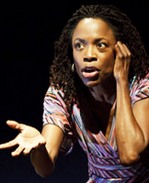SITE GUIDE
SEARCH
REVIEWS
REVIEW ARCHIVES
ADVERTISING AT CURTAINUP
FEATURES
NEWS
Etcetera and
Short Term Listings
LISTINGS
Broadway
Off-Broadway
NYC Restaurants
BOOKS and CDs
OTHER PLACES
Berkshires
London
California
New Jersey
DC
Connecticut
Philadelphia
Elsewhere
QUOTES
TKTS
PLAYWRIGHTS' ALBUMS
LETTERS TO EDITOR
FILM
LINKS
MISCELLANEOUS
Free Updates
Masthead
A CurtainUp Review
The Night Watcher
|
What do you know about it? I was my parents' right hand. I couldn't wait
to get to the rest of my life. So I could live free. . .free as air. I couldn't wait to get
to college to finally be free of kids. . . I was 35 years old when my grandmother
saw me out in the field playing kickball with a bunch of kids. She said, 'Looka
there. . . Charlayne has finally grown up to be a child!'—
|

Charlayne Woodard
(Photo: James Leynse) |
In Woodward's current solo show, The Night Watcher, directed by Daniel Sullivan, she recounts with considerable tenderness and humor the various stories of the children she has mentored. These were children whose parents were absent, deceased or incompetent. In fact, the number of parents Woodward has known who would not or could not raise their own children is truly remarkable. Or perhaps, in these days of dysfunctional families and fragile relationships, one should not really be surprised.
Woodward plays all the roles — from her long-suffering husband, Harris, who is forever being placed on the back burner to make room for Woodward's newest project, to the ineffectual parents and even the troubled children. She does okay with the adults, but the children all have the same naïve cluelessness that makes them too sweet and cloying to be believable. Woodward may have had lots of experience with children, but she seems unwilling to show just how savvy and knowing they (perhaps unfortunately) are today.
The traumatized children we meet include a teenage godchild (Indira) who gets herself pregnant; a "mixed race" niece (Benamarie) who needs to be taught the value of being a little black girl; the great grandchild (Kya) of a girlfriend's client, whose own mother threw her on the floor in a fit of anger; the motherless daughter (Africa) of a friend, who is abused by an uncle and then battered by her aunt; and a nephew (Nala, the night watcher) who has an abusive stepfather and needs to be encouraged to win the relay race for his school. There's even a section devoted to Woodward's own aunties. There's Auntie Pauline who bought Woodward clothing and took her to matinees. There's also Auntie Emma, the first black cheerleader at Albany High School, who passes the torch to Woodward. Finally, there's Miss Ruth, the only person with a master's Woodward knew while growing up, a beloved mentor who urged Woodward on to pursue knowledge.
The Night Watcher is certainly inspirational. Who could resist all those needy, innocent children? Who would be so cynical not to admire Woodward for the caring and comfort she offered them between gigs? What's more, Sullivan has augmented the story with appropriate music and projections that bring Woodward back to the time she is telling us about.
But what is the purpose of this two hour (with intermission) monologue? Is it to convince the audience to take better care of children? Is it to give Woodward a chance to feel better about her decision not to bear children? At the end of the two hours, she lists all the reasons she and her husband never had children: her parents' life issues, health issues and money issues; their own busy schedule. She concludes by informing an African man she meets in the subway, ". . .the world doesn't need more kids, mister, as much as it needs more people to step into the gap and help the kids who are already here." Maybe that's why at times The Night Watcher seems as if it might be more appropriate for a therapist than an audience.
|
The Night Watcher Written and performed by Charlayne Woodward Directed by Daniel Sullivan Set Design: Charlie Corcoran and Thomas Lynch Costume Design: Jess Goldstein Lighting Design: Geoff Korf Original Music and Sound Design: Obadiah Eaves Projection Design Tal Yarden Primary stages www.primarystages.org at 59E59 Theaters Running Time: 2 hours with one intermission From 9/22/09; opening 10/06/09; closing 10/31/09 Tuesdays at 7:00 p.m., Wednesdays through Fridays at 8:00 p.m., Saturdays at 2:00 p.m. & 8:00 p.m., with Sunday matinees at 3:00 p.m. on October 4th & 11th, and Wednesday matinees at 2:00 p.m. on October 14th, 21st & 28th Tickets: $45 Reviewed by Paulanne Simmons Oct. 4, 2009 |
|
Subscribe to our FREE email updates with a note from editor Elyse Sommer about additions to the website -- with main page hot links to the latest features posted at our numerous locations. To subscribe,
E-mail: esommer@curtainup.comesommer@curtainup.com
put SUBSCRIBE CURTAINUP EMAIL UPDATE in the subject line and your full name and email address in the body of the message -- if you can spare a minute, tell us how you came to CurtainUp and from what part of the country. |
|
REVIEW FEEDBACK Highlight one of the responses below and click "copy" or"CTRL+C"
Paste the highlighted text into the subject line (CTRL+ V): Feel free to add detailed comments in the body of the email. . .also the names and emails of any friends to whom you'd like us to forward a copy of this review. |






